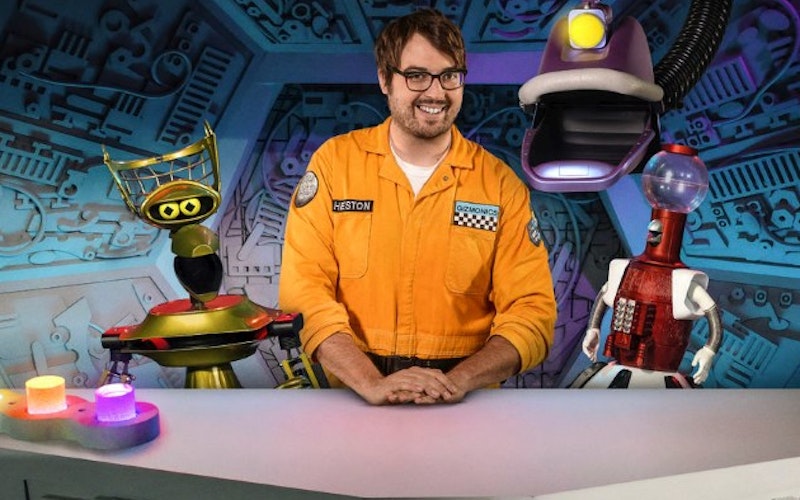
TV
Mystery Science Theatre 3000 and the Transformational Power of Laughter
After initial funding from enthusiastic fans via Kickstarter, Mystery Science Theatre 3000 has come to Netflix for an 11th season with new host Jonah Ray.
If you aren’t already familiar with the cult classic, you will likely be confused by the new episodes. It’s a unique concept built around a thin premise: evil villains have forced the host and his robot friends to watch terrible movies, which they survive with a constant patter of quips and references. The premise is really only there to give a context for the real point of the show: the jokes. In fact, the theme song warns you if you’re wondering about details, such as “how he eats and breathes and other science facts,” you should “just think to yourself it’s just a show, I should really just relax.” The laid-back commitment to the premise is part of the show’s low-budget ethos.
I started watching the new season over Easter weekend, and it struck me that it was an appropriate match in the way it flips conventional thinking on its head. The show takes really bad movies and makes them something I enjoy as much as a good movie. And, to be clear, most of these movies are not in the category that the podcast The Flop House (incidentally co-hosted by new MST3K head writer Elliott Kalan) would call “good bad.” They are just plain bad: boring, poorly paced, and terribly acted. What Mystery Science Theatre 3000 does is bring an unbridled sense of joy and even delight into riffing on these movies. The show takes the very elements that make the movies nearly unwatchable on their own and turns them into the best, most hilarious parts. And that’s where, in the context of celebrating Jesus’ life-changing work on the cross, I saw a tiny bit of redemption in this form of comedy.
A strange and silly television show seems an unlikely place to see the way God redeems the world through comic community.
A lot of the humor in MST3K does come at the expense of the movie. For instance, in the second episode, “Cry Wilderness,” plenty of comic attention is given to the poorly focused nature scenes. Joking about why the mountain lion is out of focus when the rocks are perfect is funny, but not particularly transformative. That critical impulse doesn’t have as much in common with God’s redemptive work as some of the other jokes, which are based more in silliness, references, and (often the best ones) sheer delight in having fun with others. I think the companionship of the main jokesters is what makes the show feel like you’re hanging out with your funniest friends, enjoying spending time together and making something boring fun.
Like most fans of the series, I like MST3K because of its distinctive sense of humor and the rapid pace of its jokes. I also like it because it reminds me that anything is better if you have friends around, even terrible movies. A strange and silly television show, mostly popularized through word of mouth and the Internet of the 1990s, seems an unlikely place to see the way God redeems the world through comic community. Nevertheless, there it is: joy and friendship taking something terrible and making it into something comforting and fun. So fun, in fact, that thousands of fans contributed to that Kickstarter campaign (48,000 in fact).
It’s not a complete picture of the message of Easter, of course. I wouldn’t expect so much from something so silly. But the basic movement of joy and friendship redeeming something in a surprising way—that feels Eastery enough for me.
Topics: TV, Culture At Large, Arts & Leisure